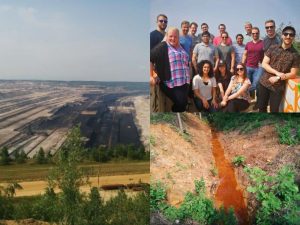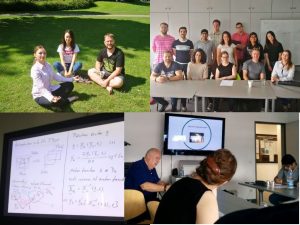Early Stage Researcher Neha Mehta tells us about the week at UDE – the final summer school of REMEDIATE…
What are you going to do after your PhD?
Are you thinking of industrial positions or are you in academia for the long haul?
When are you planning to defend your thesis?
Questions like these become part of the final year for every PhD student. Everyone from fellow PhDs to professors, from receptionists to the financial services section of our department, ask these questions. Half of our brain works on writing the thesis while the other half grapples between viva questions and interview preparations. It was in midst of these thoughts and preparations, that all of us attended the last REMEDIATE summer school at the University of Duisburg-Essen. This summer school provided us with an exciting opportunity to immerse ourselves in career growth aspects such as interview preparations, writing cover letters, and preparing for the job that we want, while also enhancing our scientific knowledge through sessions on modelling and site visits. The schedule contained a perfect blend of technical and soft skills and gave us chance to learn:
The Theory of Porous Media
Numerical models describing flow and transport of chemically active species in porous media can provide a powerful tool for analysing a wide variety of problems. For example, reactive transport models are used to predict the rate of migration of a contaminant plume resulting from heavy metal mobilization. To elaborate our understanding of contaminant transport we discussed continuum hypothesis, classical conservation equations of mass and energy, and introducing simplifications of the real physical systems to the model.
In all engineering problems, it will always be necessary to calibrate a model description to field data before making predictions. Evaluating field scale heterogeneities and variables necessitates close collaboration between modelling, experiments, and field observations.
Start preparing for a job
From submitting progress reports to writing scientific articles, from attending conferences and networking events to mentoring masters students, there are numerous tasks entailed in our PhD programme that lead to the development of skills that are required both for industrial and academic jobs. We should pay heed to these competencies and start preparing for the job we want.
In this session we focused on how to highlight our skills for the position we want in any sector. How to transition from academia to industry? What are good job search websites for job openings and possibilities? What mistakes should be avoided in our curriculum vitae? We learned that if we have our eyes set on a big, long term goal, the road ahead may not be straight.
Success career trajectories can have lots of zigzagging. We need to understand that there is more than just one model and more than just one path to reach a destination.
Defending your Doctoral thesis
So, I made it. Yeeeyyy! Years of hard work, culminating into one day. A PhD defence is a serious ceremony. In this session we learned the tricks and tips for defending our PhD thesis. We gained insights on the process and purpose of the viva, considered a range of viva questions and identified effective viva preparation strategies. We were also given the chance to look at mock viva questions in groups. A well written thesis along with presentation skills is king to a great viva experience. Nailing an excellent presentation of our work can be done with simple slides, timing, and flow in delivery.
On the defence day you are the expert in the room. Trust your brain. This is your day. No one in the world has recently spent the same length of time understanding this specific topic.
Site visit
To understand the impacts on groundwater due to coal mining, we visited the Hambach site. This open mining site is located in heart of a lignite mining area in North Rhine Westphalia. We saw the drainage water from the mining activities and also visited the extraction site. Everything at the mine appeared to be in a giant scale. We viewed the machines extracting coal and moving around sand and dirt. Everything from mine pit to machines transcended us to the world of science fiction movies.
Writing grant applications
In today’s cut-throat world of grants and research proposals, being an Early Career Researcher can feel daunting. During the session on grant applications, we learned the reasons behind writing grant applications. The writing procedure for grants should include simple language, balance between problems identified and solutions proposed, tell a story based on facts and visuals, and relate it to the goals of the funding organization.
The best grant proposals are simple, straightforward, and easily understood.
The summer school was such a great experience for every one of us involved, as not only was there time for lessons but also for enjoying the summer!

